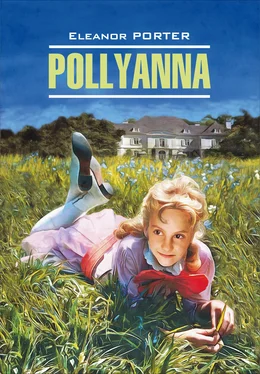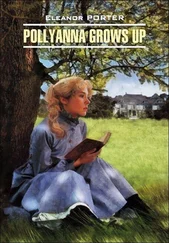Элинор Портер - Pollyanna / Поллианна. Книга для чтения на английском языке
Здесь есть возможность читать онлайн «Элинор Портер - Pollyanna / Поллианна. Книга для чтения на английском языке» — ознакомительный отрывок электронной книги совершенно бесплатно, а после прочтения отрывка купить полную версию. В некоторых случаях можно слушать аудио, скачать через торрент в формате fb2 и присутствует краткое содержание. Город: Санкт-Петербург, Год выпуска: 2017, ISBN: 2017, Издательство: Литагент Каро, Жанр: foreign_language, literature_20, foreign_prose, Детская проза, на английском языке. Описание произведения, (предисловие) а так же отзывы посетителей доступны на портале библиотеки ЛибКат.
- Название:Pollyanna / Поллианна. Книга для чтения на английском языке
- Автор:
- Издательство:Литагент Каро
- Жанр:
- Год:2017
- Город:Санкт-Петербург
- ISBN:978-5-9925-1113-0
- Рейтинг книги:4 / 5. Голосов: 1
-
Избранное:Добавить в избранное
- Отзывы:
-
Ваша оценка:
- 80
- 1
- 2
- 3
- 4
- 5
Pollyanna / Поллианна. Книга для чтения на английском языке: краткое содержание, описание и аннотация
Предлагаем к чтению аннотацию, описание, краткое содержание или предисловие (зависит от того, что написал сам автор книги «Pollyanna / Поллианна. Книга для чтения на английском языке»). Если вы не нашли необходимую информацию о книге — напишите в комментариях, мы постараемся отыскать её.
Книга адресована всем любителям англоязычной литературы.
Pollyanna / Поллианна. Книга для чтения на английском языке — читать онлайн ознакомительный отрывок
Ниже представлен текст книги, разбитый по страницам. Система сохранения места последней прочитанной страницы, позволяет с удобством читать онлайн бесплатно книгу «Pollyanna / Поллианна. Книга для чтения на английском языке», без необходимости каждый раз заново искать на чём Вы остановились. Поставьте закладку, и сможете в любой момент перейти на страницу, на которой закончили чтение.
Интервал:
Закладка:
Slowly the minister folded the papers and thrust them back into his pocket. Then, with a sigh that was almost a moan, he flung himself down at the foot of a tree, and covered his face with his hands.
It was there that Pollyanna, on her way home from the Pendleton house, found him. With a little cry she ran forward.
“Oh, oh, Mr. Ford! You – YOU haven’t broken YOUR leg or – or anything, have you?” she gasped.
The minister dropped his hands, and looked up quickly. He tried to smile.
“No, dear – no, indeed! I’m just – resting.”
“Oh,” sighed Pollyanna, falling back a little. “That’s all right, then. You see, Mr. Pendleton HAD broken his leg when I found him – but he was lying down, though. And you are sitting up.”
“Yes, I am sitting up; and I haven’t broken anything – that doctors can mend.”
The last words were very low, but Pollyanna heard them. A swift change crossed her face. Her eyes glowed with tender sympathy.
“I know what you mean – something plagues you [151] something plagues you – ( уст. ) что-то вас беспокоит
. Father used to feel like that, lots of times. I reckon ministers do – most generally. You see there’s such a lot depends on ’em, somehow.”
The Rev. Paul Ford turned a little wonderingly.
“Was YOUR father a minister, Pollyanna?”
“Yes, sir. Didn’t you know? I supposed everybody knew that. He married Aunt Polly’s sister, and she was my mother.”
“Oh, I understand. But, you see, I haven’t been here many years, so I don’t know all the family histories.”
“Yes, sir – I mean, no, sir,” smiled Pollyanna.
There was a long pause. The minister, still sitting at the foot of the tree, appeared to have forgotten Pollyanna’s presence. He had pulled some papers from his pocket and unfolded them; but he was not looking at them. He was gazing, instead, at a leaf on the ground a little distance away – and it was not even a pretty leaf. It was brown and dead.
Pollyanna, looking at him, felt vaguely sorry for him.
“It – it’s a nice day,” she began hopefully.
For a moment there was no answer; then the minister looked up with a start.
“What? Oh! – yes, it is a very nice day.”
“And ’tisn’t cold at all, either, even if ’tis October,” observed Pollyanna, still more hopefully. “Mr. Pendleton had a fire, but he said he didn’t need it. It was just to look at. I like to look at fires, don’t you?”
There was no reply this time, though Pollyanna waited patiently, before she tried again – by a new route.
“Do you like being a minister?”
The Rev. Paul Ford looked up now, very quickly.
“Do I like – Why, what an odd question! Why do you ask that, my dear?”
“Nothing – only the way you looked. It made me think of my father. He used to look like that – sometimes.”
“Did he?” The minister’s voice was polite, but his eyes had gone back to the dried leaf on the ground.
“Yes, and I used to ask him just as I did you if he was glad he was a minister.”
The man under the tree smiled a little sadly.
“Well – what did he say?”
“Oh, he always said he was, of course, but ’most always he said, too, that he wouldn’t STAY a minister a minute if ’twasn’t for the rejoicing texts.”
“The – WHAT?” The Rev. Paul Ford’s eyes left the leaf and gazed wonderingly into Pollyanna’s merry little face.
“Well, that’s what father used to call ’em,” she laughed. “Of course the Bible didn’t name ’em that. But it’s all those that begin ‘Be glad in the Lord’, or ‘rejoice greatly’, or ‘shout for joy’, and all that, you know – such a lot of ’em. Once, when father felt specially bad, he counted ’em. There were eight hundred of ’em.”
“Eight hundred!”
“Yes – that told you to rejoice and be glad, you know; that’s why father named ’em the ‘rejoicing texts.’”
“Oh!” There was an odd look on the minister’s face. His eyes had fallen to the words on the top paper in his hands – “But woe unto you, scribes and Pharisees, hypocrites!” “And so your father – liked those ‘rejoicing texts’,” he murmured.
“Oh, yes,” nodded Pollyanna, emphatically. “He said he felt better right away [152] he felt better right away – ( разг. ) ему сразу полегчало
, that first day he thought to count ’em. He said if God took the trouble to tell us eight hundred times to be glad and rejoice, He must want us to do it – SOME. And father felt ashamed that he hadn’t done it more. After that, they got to be such a comfort to him, you know, when things went wrong; when the Ladies’ Aiders got to fight – I mean, when they DIDN’t AGREE about something,” corrected Pollyanna, hastily. “Why, it was those texts, too, father said, that made HIM think of the game – he began with ME on the crutches – but he said ’twas the rejoicing texts that started him on it.”
“And what game might that be? [153] what game might that be – ( разг. ) что это за игра?
” asked the minister.
“About finding something in everything to be glad about, you know. As I said, he began with me on the crutches.” And once more Pollyanna told her story – this time to a man who listened with tender eyes and understanding ears.
A little later Pollyanna and the minister descended the hill, hand in hand. Pollyanna’s face was radiant. Pollyanna loved to talk, and she had been talking now for some time: there seemed to be so many, many things about the game, her father, and the old home life that the minister wanted to know.
At the foot of the hill their ways parted, and Pollyanna down one road, and the minister down another, walked on alone.
In the Rev. Paul Ford’s study that evening the minister sat thinking. Near him on the desk lay a few loose sheets of paper – his sermon notes. Under the suspended pencil in his fingers lay other sheets of paper, blank – his sermon to be [154] his sermon to be – ( разг. ) его будущая проповедь
. But the minister was not thinking either of what he had written, or of what he intended to write. In his imagination he was far away in a little Western town with a missionary minister who was poor, sick, worried, and almost alone in the world – but who was poring over the Bible to find how many times his Lord and Master had told him to “rejoice and be glad.”
After a time, with a long sigh, the Rev. Paul Ford roused himself, came back from the far Western town, and adjusted the sheets of paper under his hand.
“Matthew, twenty-third; 13–14 and 23,” he wrote; then, with a gesture of impatience, he dropped his pencil and pulled toward him a magazine left on the desk by his wife a few minutes before. Listlessly his tired eyes turned from paragraph to paragraph until these words arrested them:
“A father one day said to his son, Tom, who, he knew, had refused to fill his mother’s woodbox that morning: ‘Tom, I’m sure you’ll be glad to go and bring in some wood for your mother.’ And without a word Tom went. Why? Just because his father showed so plainly that he expected him to do the right thing. Suppose he had said: ‘Tom, I overheard what you said to your mother this morning, and I’m ashamed of you. Go at once and fill that wood-box!’ I’ll warrant that woodbox would be empty yet, so far as Tom was concerned!”
On and on read the minister – a word here, a line there, a paragraph somewhere else:
“What men and women need is encouragement. Their natural resisting powers should be strengthened, not weakened… Instead of always harping on a man’s faults, tell him of his virtues. Try to pull him out of his rut of bad habits. Hold up to him his better self, his REAL self that can dare and do and win out!.. The influence of a beautiful, helpful, hopeful character is contagious, and may revolutionize a whole town… People radiate what is in their minds and in their hearts. If a man feels kindly and obliging, his neighbors will feel that way, too, before long. But if he scolds and scowls and criticizes – his neighbors will return scowl for scowl, and add interest!… [155] and add interest! – ( разг. ) да еще и с процентами!
When you look for the bad, expecting it, you will get it. When you know you will find the good – you will get that… Tell your son Tom you KNOW he’ll be glad to fill that wood-box – then watch him start, alert and interested!”
Интервал:
Закладка:
Похожие книги на «Pollyanna / Поллианна. Книга для чтения на английском языке»
Представляем Вашему вниманию похожие книги на «Pollyanna / Поллианна. Книга для чтения на английском языке» списком для выбора. Мы отобрали схожую по названию и смыслу литературу в надежде предоставить читателям больше вариантов отыскать новые, интересные, ещё непрочитанные произведения.
Обсуждение, отзывы о книге «Pollyanna / Поллианна. Книга для чтения на английском языке» и просто собственные мнения читателей. Оставьте ваши комментарии, напишите, что Вы думаете о произведении, его смысле или главных героях. Укажите что конкретно понравилось, а что нет, и почему Вы так считаете.












